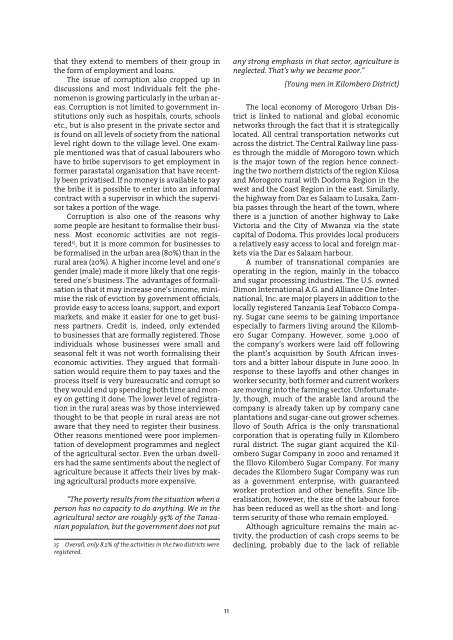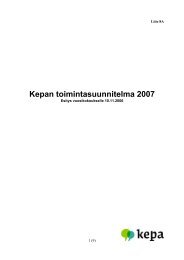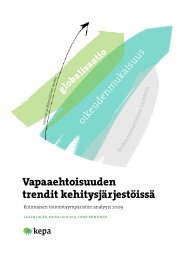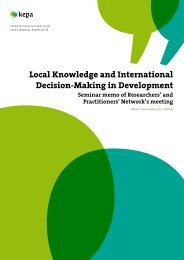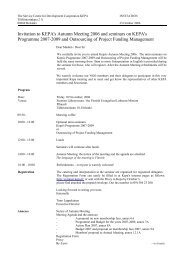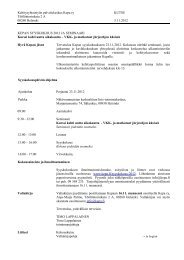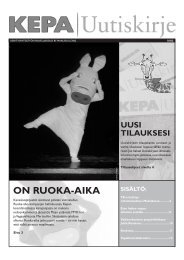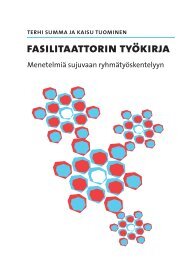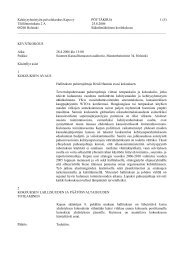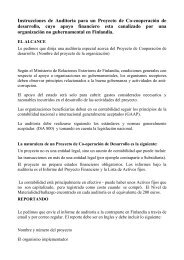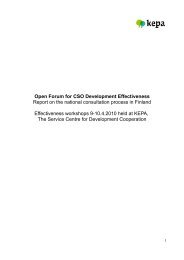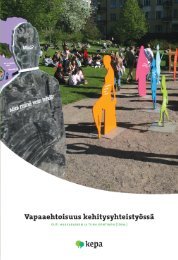Poverty in Tanzania - An Analysis of Impoverishment ... - Into-eBooks
Poverty in Tanzania - An Analysis of Impoverishment ... - Into-eBooks
Poverty in Tanzania - An Analysis of Impoverishment ... - Into-eBooks
Create successful ePaper yourself
Turn your PDF publications into a flip-book with our unique Google optimized e-Paper software.
that they extend to members <strong>of</strong> their group <strong>in</strong><br />
the form <strong>of</strong> employment and loans.<br />
The issue <strong>of</strong> corruption also cropped up <strong>in</strong><br />
discussions and most <strong>in</strong>dividuals felt the phenomenon<br />
is grow<strong>in</strong>g particularly <strong>in</strong> the urban areas.<br />
Corruption is not limited to government <strong>in</strong>stitutions<br />
only such as hospitals, courts, schools<br />
etc., but is also present <strong>in</strong> the private sector and<br />
is found on all levels <strong>of</strong> society from the national<br />
level right down to the village level. One example<br />
mentioned was that <strong>of</strong> casual labourers who<br />
have to bribe supervisors to get employment <strong>in</strong><br />
former parastatal organisation that have recently<br />
been privatised. If no money is available to pay<br />
the bribe it is possible to enter <strong>in</strong>to an <strong>in</strong>formal<br />
contract with a supervisor <strong>in</strong> which the supervisor<br />
takes a portion <strong>of</strong> the wage.<br />
Corruption is also one <strong>of</strong> the reasons why<br />
some people are hesitant to formalise their bus<strong>in</strong>ess.<br />
Most economic activities are not registered<br />
15 , but it is more common for bus<strong>in</strong>esses to<br />
be formalised <strong>in</strong> the urban area (80%) than <strong>in</strong> the<br />
rural area (20%). A higher <strong>in</strong>come level and one’s<br />
gender (male) made it more likely that one registered<br />
one’s bus<strong>in</strong>ess. The advantages <strong>of</strong> formalisation<br />
is that it may <strong>in</strong>crease one’s <strong>in</strong>come, m<strong>in</strong>imise<br />
the risk <strong>of</strong> eviction by government <strong>of</strong>ficials,<br />
provide easy to access loans, support, and export<br />
markets, and make it easier for one to get bus<strong>in</strong>ess<br />
partners. Credit is, <strong>in</strong>deed, only extended<br />
to bus<strong>in</strong>esses that are formally registered. Those<br />
<strong>in</strong>dividuals whose bus<strong>in</strong>esses were small and<br />
seasonal felt it was not worth formalis<strong>in</strong>g their<br />
economic activities. They argued that formalisation<br />
would require them to pay taxes and the<br />
process itself is very bureaucratic and corrupt so<br />
they would end up spend<strong>in</strong>g both time and money<br />
on gett<strong>in</strong>g it done. The lower level <strong>of</strong> registration<br />
<strong>in</strong> the rural areas was by those <strong>in</strong>terviewed<br />
thought to be that people <strong>in</strong> rural areas are not<br />
aware that they need to register their bus<strong>in</strong>ess.<br />
Other reasons mentioned were poor implementation<br />
<strong>of</strong> development programmes and neglect<br />
<strong>of</strong> the agricultural sector. Even the urban dwellers<br />
had the same sentiments about the neglect <strong>of</strong><br />
agriculture because it affects their lives by mak<strong>in</strong>g<br />
agricultural products more expensive.<br />
“The poverty results from the situation when a<br />
person has no capacity to do anyth<strong>in</strong>g. We <strong>in</strong> the<br />
agricultural sector are roughly 95% <strong>of</strong> the <strong>Tanzania</strong>n<br />
population, but the government does not put<br />
5 Overall, only 8.2% <strong>of</strong> the activities <strong>in</strong> the two districts were<br />
registered.<br />
11<br />
any strong emphasis <strong>in</strong> that sector, agriculture is<br />
neglected. That’s why we became poor.”<br />
(Young men <strong>in</strong> Kilombero District)<br />
The local economy <strong>of</strong> Morogoro Urban District<br />
is l<strong>in</strong>ked to national and global economic<br />
networks through the fact that it is strategically<br />
located. All central transportation networks cut<br />
across the district. The Central Railway l<strong>in</strong>e passes<br />
through the middle <strong>of</strong> Morogoro town which<br />
is the major town <strong>of</strong> the region hence connect<strong>in</strong>g<br />
the two northern districts <strong>of</strong> the region Kilosa<br />
and Morogoro rural with Dodoma Region <strong>in</strong> the<br />
west and the Coast Region <strong>in</strong> the east. Similarly,<br />
the highway from Dar es Salaam to Lusaka, Zambia<br />
passes through the heart <strong>of</strong> the town, where<br />
there is a junction <strong>of</strong> another highway to Lake<br />
Victoria and the City <strong>of</strong> Mwanza via the state<br />
capital <strong>of</strong> Dodoma. This provides local producers<br />
a relatively easy access to local and foreign markets<br />
via the Dar es Salaam harbour.<br />
A number <strong>of</strong> transnational companies are<br />
operat<strong>in</strong>g <strong>in</strong> the region, ma<strong>in</strong>ly <strong>in</strong> the tobacco<br />
and sugar process<strong>in</strong>g <strong>in</strong>dustries. The U.S. owned<br />
Dimon International A.G. and Alliance One International,<br />
Inc. are major players <strong>in</strong> addition to the<br />
locally registered <strong>Tanzania</strong> Leaf Tobacco Company.<br />
Sugar cane seems to be ga<strong>in</strong><strong>in</strong>g importance<br />
especially to farmers liv<strong>in</strong>g around the Kilombero<br />
Sugar Company. However, some 3,000 <strong>of</strong><br />
the company’s workers were laid <strong>of</strong>f follow<strong>in</strong>g<br />
the plant’s acquisition by South African <strong>in</strong>vestors<br />
and a bitter labour dispute <strong>in</strong> June 2000. In<br />
response to these lay<strong>of</strong>fs and other changes <strong>in</strong><br />
worker security, both former and current workers<br />
are mov<strong>in</strong>g <strong>in</strong>to the farm<strong>in</strong>g sector. Unfortunately,<br />
though, much <strong>of</strong> the arable land around the<br />
company is already taken up by company cane<br />
plantations and sugar-cane out grower schemes.<br />
Ilovo <strong>of</strong> South Africa is the only transnational<br />
corporation that is operat<strong>in</strong>g fully <strong>in</strong> Kilombero<br />
rural district. The sugar giant acquired the Kilombero<br />
Sugar Company <strong>in</strong> 2000 and renamed it<br />
the Illovo Kilombero Sugar Company. For many<br />
decades the Kilombero Sugar Company was run<br />
as a government enterprise, with guaranteed<br />
worker protection and other benefits. S<strong>in</strong>ce liberalisation,<br />
however, the size <strong>of</strong> the labour force<br />
has been reduced as well as the short- and longterm<br />
security <strong>of</strong> those who rema<strong>in</strong> employed.<br />
Although agriculture rema<strong>in</strong>s the ma<strong>in</strong> activity,<br />
the production <strong>of</strong> cash crops seems to be<br />
decl<strong>in</strong><strong>in</strong>g, probably due to the lack <strong>of</strong> reliable


